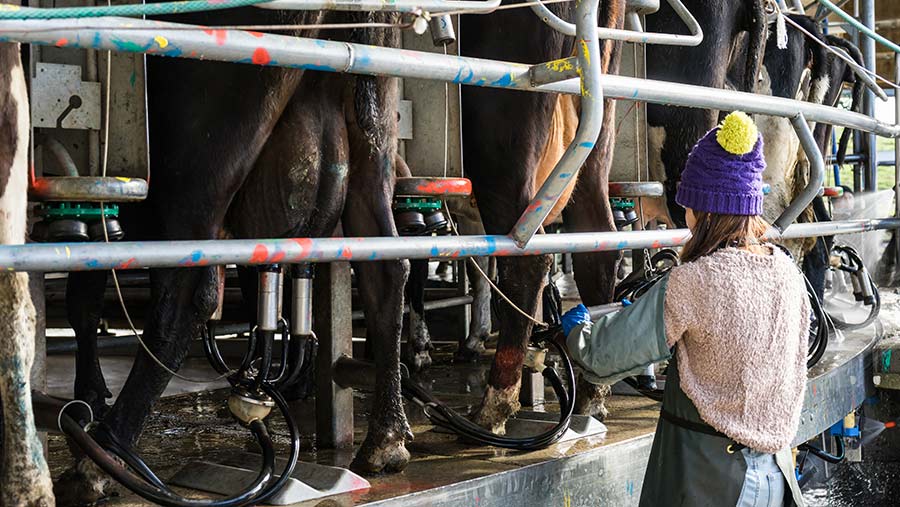What makes a good employer on a dairy farm?
 © Naruedom/Adobe Stock
© Naruedom/Adobe Stock Finding – and keeping – good-quality staff is a growing problem for dairy farm owners and managers.
To help tackle this, LIC consultant Piers Badnell asked employees of 20 dairy farms what they thought makes a good boss. Top of their list of attributes was not money but communication.
See also: 9 tips on employing dairy staff for the first time
“Money was fifth, so, important, but not everything,” he says.
However, those questioned did say the difference between working for a good boss and a bad boss is about £10,000.
“Staff expect more money to stay with someone who is negative, works them too hard, doesn’t communicate. In fact, the opposites of all their requirements.” [See “What makes a good employer”]
He adds: “Staff retention starts with understanding your business and what you need: that drives job description and whether the role needs skilled labour.
“Business owners need to review what skills are missing and what they want people to do, then build a picture around that, and pay accordingly.”
People management courses
Piers thinks bosses should attend courses on people management to learn about personality types and understand different learning styles.
This helps be more effective with communication and delegation. “Understand the people you employ,” he says.
Effective delegation is third on the wishlist for a good boss.
However, not everyone wants responsibility, so it is important to recognise those who are self-motivated and want to be left alone to get on with their work and those who need guidance, he says.

Piers Badnell © LIC
Working environment
Work/life balance, helped by a good working rota, is also important in the job market.
Piers says employees are more productive if they are well rested and take their allocated holidays. It also cuts staff turnover.
“The days of working 5am to 7pm are history. You will struggle to attract people if you follow the traditional every-other-weekend-off rota,” he says.
A common perception is that young people do not want to work long, unsociable hours.
But Piers points to supermarkets and fast-food outlets that successfully employ young people at evenings and weekends.
The key, he says, is to provide a pleasant working environment.
“You need light, bright parlours, not a dark, dank hole to milk in. Provide a staff car park on concrete, not six inches of slurry, and give staff a changing room.
“Look at what those town businesses do to offer staff a good working environment.”
Staff involvement
Feeling involved in the business came second on the good employer list. Piers says this can start by discussing plans for the week or month ahead, building up to talking about where the business is heading.
Employees can learn how their input helps. “Good people will want to understand the bigger picture, where it’s going and want to chip in,” he adds.
Team meetings are part of good communication, as people need to know what is expected of them, and how their role affects team mates.
“WhatsApp groups are great, but you can’t rely on them. This is where understanding different people comes in.
“You need a mix of communication methods and styles, and to involve everyone from the farm owner to the relief milker.”
Responsibility – or not
Appreciating people’s personalities is also useful when it comes to giving responsibility – another attribute on the herdsmen’s list.
However, Piers says a small challenge for one person might be terrifying for another.
“Some people only want to milk cows and have nothing to do with calves or silage making. But value them accordingly,” he says.
Ultimately, a dairy farmer who has never worked for someone else will not understand the difference between working long, dedicated hours running a family business, and being employed.
Piers believes the temptation then is to see labour as a cost. “And if you think of it like this, you will try to trim it or cut it out altogether,” he says.
“Labour is only a cost when you employ the wrong person. If you can’t fulfil the requirements in the list, I would say have a good look at yourself and start making changes.
“Look at what you can improve, go on a course. Otherwise, you won’t keep people, you will just get a bad name and a high turnover.”
Top 10 attributes of a good boss
- Communication
- Involving staff in what is going on
- Delegation
- Sense of humour
- Money (£40k herd manager to work for bad boss, £30k for a good boss)
- Good rota, time off
- Good facilities (no baler twine holding things together)
- Simple system where everyone knows what is going on
- Clear responsibilities
- Lifestyle
Source: Piers Badnell, from a survey of employees from 20 dairy farms
What does a good job include?
Work/life balance
Examples: a five-day week (six during calving); 10-in-seven milking; simple management system.
Rather than 4am starts and 7pm finishes to the working day, make it 5am to 5pm, with one-to-two hours breakfast and half an hour to an hour for lunch; every other weekend off; flexible rota.
Technology employed
For example, a modern, quick parlour (if milking takes longer than two hours, each staff member should only milk morning or evening, or on a shift basis); heat detection collars.
Apprenticeships and training
If people are good, pay more than the minimum – it shows you value them.
Understand what the apprentice wants out of it and what you have to offer (career path, accommodation).
Training needs to focus on return on investment, then spend accordingly, appropriate to the job role.
Career path
Let people know how they can progress in the industry, take on responsibility, and what is offered in the job package (house, pension, money).
Source: Piers Badnell
